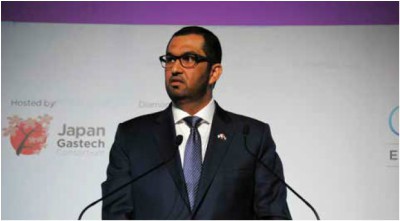Gastech ’17: ADNOC chief touts strategic, value-added partnerships in promoting growth
Kurt Abraham, Editor, World Oil
TOKYO -- Some key drivers are helping Abu Dhabi National Oil Co. (ADNOC) realize its ambitious growth plans, said His Excellency, Dr. Sultan Ahmed Al Jaber, UAE Minister of State and ADNOC Group CEO, during a ministerial address on Tuesday.
 |
|
His Excellency, Dr. Sultan Ahmed Al Jaber, UAE Minister of State and ADNOC |
Among those drivers are technology and strategic, value-added partnerships, as the company seeks to ambitiously expand its business by opening new markets and offering new, diversified and high-value products.
Expanding on his partnership theme, Dr. Al Jaber said that the industry must collectively rethink its partnership models as a response to changing market dynamics. “In this new energy era, the success of our industry and our companies will be driven by long-term, value-added and integrated partnership models across the value chain, that leverage innovative technology and market access,” he explained. “Such integrated partnerships will require energy companies to think, plan and act differently to deliver future growth.”
Focus on technology, relationships. Dr. Al Jaber emphasized that technology and partnerships are at the heart of ADNOC’s growth strategy and five-year business plan.
Those efforts are focused on driving efficiency, improving performance and maximizing value to deliver a more profitable upstream operation; a more valuable downstream sector; a more economic, sustainable supply of gas; and world-class talent.
“At ADNOC, we have set forth on an ambitious growth plan, and invite the industry to join us on our journey by shaping strategic partnerships that deliver technology, enhance market access and leverage value across our integrated upstream, midstream and downstream portfolio,” he said.
“In particular,” Dr. Al Jaber continued, “we see tremendous opportunity in capitalizing on emerging global downstream growth, which represents the fastest-growing segment of the energy industry.”
Dr. Al Jaber said that ADNOC would work closely with industry partners that appreciate the scale of the opportunity, share the firm’s values and are willing to take risks “in search of greater and stable rewards, as we aim to grow new markets and offer new, diversified and high-value products to those markets.”
ADNOC’s growth strategy encompasses increases in upstream capacity and downstream product portfolio expansion. The company’s crude oil production is set to increase to 3.5 MMbpd by 2018. Meanwhile, sour gas output from the Al Hosn facility will be expanded by 50%. ADNOC is highly focused on its downstream business, and plans to triple production of petrochemicals and highervalue products.
Dr. Al Jaber noted that technology is enabling ADNOC’s strategy, ensuring that the company maintains its competitiveness, grows sustainably and takes full advantage of market opportunities.
“The development and application of innovative technology across the entire value chain of our business will be essential to driving efficiency and performance, and maximizing value from every barrel we produce.
We are especially focused on applying enhanced oil recovery technology to improve production levels and enhance value from our existing reservoirs.”
Four pillars to enhance performance. Dr. Al Jaber said that four key pillars are supporting ADNOC’s path to becoming a more commercially focused, performance-led organization: people, performance, profitability and efficiency. These pillars all tied to what he called “an unwavering commitment to HSE and asset integrity.”
Tailoring his remarks to an audience of some of the world’s most influential gas and LNG leaders, Dr. Al Jaber pointed out that Asia is an increasingly important market for energy producers, with its share of global gas imports growing from one-half to two-thirds of demand by 2040, even as global demand increases by 70%.
While advances in technology, combined with enhanced recovery techniques, are enabling producers to keep pace with the growth in demand, Dr. Al Jaber said that a lack of infrastructure investment must be addressed.
“Today, what is needed is better infrastructure that efficiently links producers to end-users,” he said. “This will require nearly $3 T in investment, according to the IEA, to upgrade the global gas distribution system between now and 2040. That level of funding can only be achieved through creative, committed, long-term partnerships at every level, between companies and countries, and between the public and private sectors.”
Driving customer value and future growth. Noting the UAE’s and ADNOC’s ties with Japan, the CEO called Japan one of his firm’s “longest-standing partners and customers,” and reminded attendees that ADNOC delivers one-third of Japan’s oil and has been a reliable gas supplier for more than four decades. “Our experience with Japan is a clear example of how partnerships can advance industry, deliver economic growth and enable social progress.”
ADNOC is driving efficiencies, enhancing performance and maximizing value for its shareholders, the UAE economy and society at large, added Dr. Al Jaber. Essential to this strategy is forging new partnerships throughout every aspect of upstream and downstream operations.
He concluded, “We invite all of you to join us on our very ambitious journey to push the boundaries of the possible, open up new frontiers and, together, drive the engines of prosperity.”

- RWE strengthens partnerships with ADNOC and Masdar to enhance energy security in Germany and Europe
- TotalEnergies and Mozambique announce the full restart of the $20-B Mozambique LNG project
- Venture Global wins LNG arbitration case brought by Spain's Repsol
- Mitsubishi Heavy Industries Compressor acquires Swiss rotating equipment maintenance company AST Turbo AG
- KBR awarded FEED for Coastal Bend LNG project



Comments